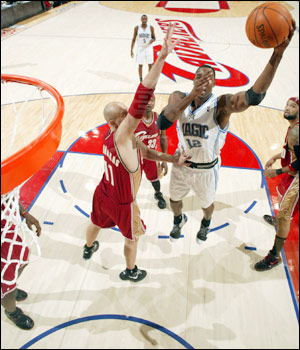Believe in Magic
At this early checkpoint, however, the Magic are the talk of the league, at least that part of the league that is talked out about the Knicks and chooses to wait for the Celtics' schedule to get a little tougher before evaluating Boston's quick start. My SI.com colleague Marty Burns has Orlando ranked fifth in his latest Power Rankings, and I think that's about right; I certainly wouldn't go lower than that. Going into Friday night's home game against Indiana, the Magic stand 16-4 despite spending 32 of their first 51 days on the road, including a bone-wearying preseason trip to China, the kind of excursion that veteran teams would be using as an alibi all the way through to 2008. (Orlando is 11-2 on the road in the regular season.)
As modest as the Magic's publicly stated goal might be -- to get back to the playoffs -- they no doubt have loftier aims, situated as they are in the Eastern Conference where the Celtics are the only other team that seems to have gotten markedly better. (Though I saw the Detroit Pistons on Wednesday night in Charlotte and they look really, really good.) If Orlando succeeds in, say, making the conference finals or getting all the way to the NBA Finals, it will be doing something very rare indeed in this league. Which is: making a quantum leap, hereafter known as a QL.
A QL is impossible to precisely quantify, but I'm establishing that one of two criterion has to be present. A team must:
1. Be coming off a poor season to make some noise (a little noise anyway) in the postseason the following year.
2. Rise from the bottom or middle of the conference to the top in one season. That is what the Magic, the eighth-ranked team in the East last season at 40-42, must do to accomplish a QL.
A non-playoff team, even one that showed vast improvement, cannot be a QL team, not in a league with as, uh, democratic a playoff system as the NBA has.
Starting with the '89-90 season, the year the NBA went to 27 teams with the acceptance of Orlando and Minnesota (Miami and Charlotte had joined the previous season), here are the top QLs in chronological order:
• The 1991-92 Cleveland Cavaliers. Won 57 games after finishing 33-49 in previous season. Lost in the conference finals to Michael Jordan's Bulls.
• The 1992-93 Charlotte Hornets. Won 44 games after finishing 31-51 in previous season. Beat Boston in the first round before losing to the Knicks.
• The 1994-95 Los Angeles Lakers. Won 48 games after finishing 33-49 in previous season. Beat Seattle in the first round before losing to San Antonio. (It's difficult to consider the Lakers as QL-ers, because they had by that point enjoyed so many championship seasons, but they do qualify.)
• The 1997-98 San Antonio Spurs. Won 56 games after finishing 20-62 in previous season. Beat Phoenix in first round before losing to Utah.
• The 1997-98 Indiana Pacers. Won 58 games after finishing 39-43 in previous season. Beat Cleveland and New York before losing to Chicago in conference finals.
• The 1998-99 Philadelphia 76ers. Went 28-22 in lockout-shortened season after finishing 31-51 in previous season. Beat Charlotte in first round before losing to Indiana.
• The 2001-02 New Jersey Nets. Won 52 games after finishing 26-56 in previous season. Made the NBA Finals where they were swept by the Lakers.
• The 2003-04 Miami Heat. Won 42 games after finishing 25-57 in previous season. Beat New Orleans in first round before losing to Indiana.
• The 2004-05 Phoenix Suns. Won 62 games after finishing 29-53 in previous season. Beat Memphis and Dallas before losing to San Antonio in conference finals.
• The 2004-05 Seattle SuperSonics. Won 52 games after finishing 37-45 in previous season. Beat Sacramento in first round before losing to San Antonio.
• The 2006-07 Golden State Warriors. Won only 42 games, after finishing 34-48 in previous season, but beat top-seeded Dallas in first round before losing to Utah. (A sketchy pick considering the Warriors improved by only eight games, but the Mavs' upset sticks in the mind.)
There are, of course, substantial reasons for some (perhaps most) of the QLs. The '97-98 Spurs improved dramatically because David Robinson came back from injury and they added a rookie named Tim Duncan. The '01-02 Nets emerged because a point guard named Jason Kidd was acquired from Phoenix. And the '04-05 Suns were, well, slightly helped by the addition of Steve Nash, who won the MVP that season.
Now what would constitute a QL for this Magic team? I'd say winning 50 games and making the conference finals, or winning 55 games and advancing at least one round. Can they do it? Without question they can. They have a budding superstar in Dwight Howard; an all-around contributor in Hedo Turkoglu; a three-point threat in Rashard Lewis (though I don't see him as a max player); a decent bench; and a steady hand on the wheel in Stan Van Gundy.
What they don't have is experience. I asked general manager Otis Smith last week what is the biggest stumbling block for young, inexperienced teams. He answered immediately.
"Sometimes the roles get away from you," he said. Your role has to expand and contract as the year goes on, and the younger guy doesn't understand that. I watch a team like San Antonio. Sometimes Tim [Duncan] is out there just facilitating and other times he has to be bigger than life and that's what he is. Knowing roles makes champions."
Keep this in mind about the Magic, too: They started quickly last year (14-5) before fading to mediocrity. But I sense something different about this team. I sense a QL is taking place, and those are always fun to watch.





